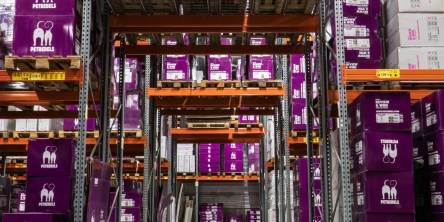The Impact of Mobile Apps on the Manufacturing Industry

The continued evolution of technology has empowered the manufacturing industry as much as it has benefitted any other sector. And one of the many ways this impact becomes evident is the emergence and growing importance of mobile apps and technology. A 2015 Forbes study revealed that 8 out of 10 CEOs of manufacturing companies had deemed mobile technology a pivotal part of their operations. It wouldn’t be a stretch to imagine that the acceptance and demand for this technology have grown multifold since then. Why? Well, because of just how good they have become at addressing the sector’s challenges. And boy, does the industry have challenges to contend with. There’s a regular delay in updating data from different aspects of the operations. This is mainly because the process continues to be mostly manual.
Then there is also the struggle with sub-standard inventory management levels and the myriad problems it further gives rise to. And let’s not forget compliance. It is decidedly one of the more complex and strenuous part of the job that ensures compliance when operations are spread across different locations. And, where the facilities are typically a Herculean task. Suffice it to say that there are plenty of challenges manufacturing companies must deal with. How can mobile apps and technology help? Here’s how:
- Quality control: Quality is essential not only because customers expect it, but also because it results in a myriad of other tangential benefits, including reduced costs for the company. Mobile apps help with that by making it easier to track the quality management process at all times. As a result, companies can also cut down the manual efforts required to execute quality checks, expenses, etc.
- Predictive analytics: Mobile apps can help manufacturing companies gather a lot more data and from a whole lot more sources than was previously possible. As a result, they gain the ability to run high-quality predictive analytics and insights into the operations and the overall business.
- Resource management: Considering the vast nature of a manufacturing company’s operations, it necessitates the use of an extensive amount of resources. This can be a challenge, but with mobile apps, it becomes amazingly simple to monitor staff, logistics, movement of products, etc. And that, in turn, ensures proper and efficient resource management.
To further drive the point home, allow us to walk you through some of the many ways mobile apps are revolutionizing the manufacturing industry.
- Mobility: With mobile apps, employees are not restricted to a desk; instead, they can move around and still do their jobs. This has far-reaching consequences for a manufacturing company in several ways. For example, one doesn’t have to receive, say, checklists physically — it can be done via the mobile app. They also make it much easier to communicate among employees.
- Improved safety: Heavy machinery can be dangerous to operate; now add to this the threat of the coronavirus. In such situations, mobile apps, along with other technologies such as IoT, help keep track of machines, their maintenance, etc. And with the additional benefits of mobile apps, such as the ones listed above, it also becomes easier to keep a safe distance.
- Better reporting: Reporting, analytics, insights — they are all vital to the seamless operations of any company’s operations, including manufacturing companies, of course. For reporting to be effective, one needs data and lots of it too. With mobile apps, data collection is also made easier, thanks to technologies like GPS tracking.
There is no denying that this sector is saddled with many challenges. However, these can be remediated with a robust mobile app as demonstrated by the above discussion. And if you want that too, go ahead and find a trusted vendor for manufacturing app development and get started on your path to better success right away.
Similar Articles
Unless you have been hiding in a cave somewhere, you would know and realize that the world is creating information at a stunning speed. While it is genuinely considered normal information that said data can now be turned into the groundwork of achievement for essentially any business in the present day and age.
Software development refers to the procedure of constituting and nourishing software applications. This provokes the utilization of many fundamentals and practices. Software development targets constitute structured, dependable, and beneficial software.
Designing a data warehouse is a strategic activity that builds the groundwork for strong data management and analytics capabilities within a business. In today's data-driven world, the systematic creation of a data warehouse is not only a technical requirement but also a critical step in harnessing the power of information for informed decision-making.
The integration of Internet of Things (IoT) technology into the construction and real estate sectors, which include buildings, infrastructure, homes, and businesses, is predicted to increase dramatically in the future. Despite this predicted expansion, the construction industry is behind other industries in terms of IoT adoption.
In this dynamic world of innovative and transformative technology, the use of Minimum Viable Product (MVP) has proven to be a winning strategy for success.
While monolithic applications may have waned in popularity during the era dominated by the cloud and microservices, interest is resurgent. Organizations, in considering their position on the application modularity spectrum, are now examining both the advantages and drawbacks of relying on microservices.
Data visualization is an indispensable tool that allows us to transform raw, and often unstructured data into insightful visuals, identify patterns, and communicate these insights to the wider audience and stakeholders.
For modern businesses to thrive, ensuring the effective management of inventory stands has become vitally important. Inventory management stands as a cornerstone of success. And the emergence of the Internet of Things (IoT) has introduced a new era of connectivity and efficiency across diverse industries.
Do you know what the following e-commerce companies have in common: Amazon, Walmart, eBay, and more? All of these e-commerce companies' apps make use of Java. Java is decidedly among the leading choices of programming language for e-commerce applications because it offers a world of benefits; for example, since Java code can be run on any platform with a Java Virtual Machine (JVM), users of e-commerce apps made with Java can access the said apps on a variety of devices.








